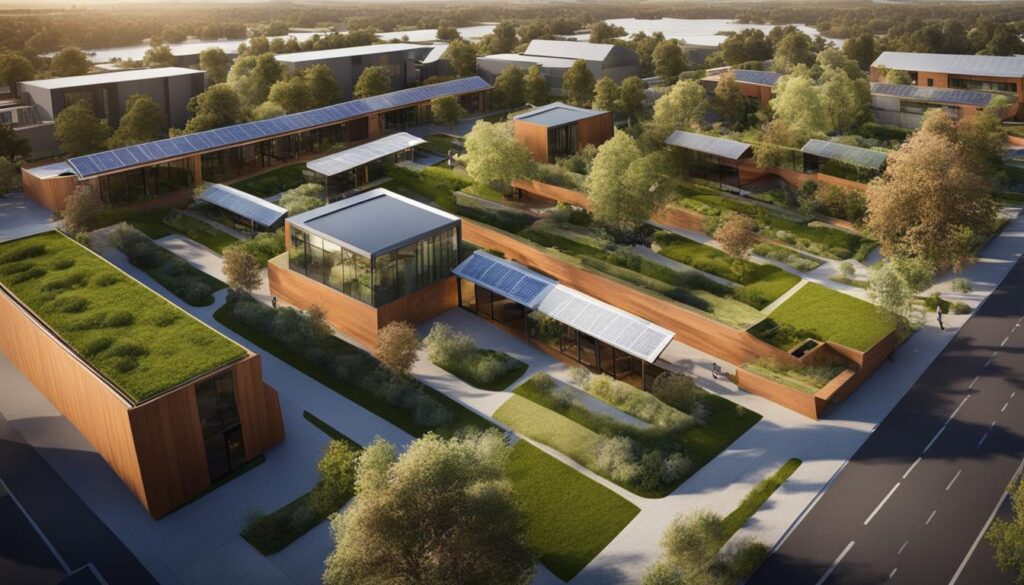G’day mates! Today, I want to take you on a journey through the world of Environmentally Sustainable Design (ESD) in the beautiful Benalla Rural City Council. Get ready to dive into the realm of sustainable architecture and discover the innovative initiatives that are shaping the future of this vibrant community.
Benalla Rural City Council is leading the way when it comes to protecting the environment and promoting sustainability. Their Environment Strategy outlines a range of proactive and strategic approaches to address important environmental and sustainability matters. From water conservation to energy production, waste recycling to native vegetation conservation, they’ve got it all covered.
So, let’s lace up our boots and explore the different aspects and initiatives that make Benalla Rural City Council a frontrunner in environmentally sustainable design and architecture.
Key Takeaways:
- Benalla Rural City Council is committed to environmentally sustainable design (ESD)
- Their Environment Strategy covers a wide range of sustainability issues
- ESD principles guide their actions and decision-making
- They are actively engaging the community in their sustainability programs
- Renewable energy and waste management are key focus areas for the council
Understanding the Environment and Sustainability Policy
I am excited to dive into the Environment and Sustainability Policy of Benalla Rural City Council. This policy serves as a guiding light, ensuring that Council activities are conducted with environmentally ethical consideration. It embraces the quadruple bottom line approach, which takes into account the environmental, social, cultural, and economic impacts of each decision.
The Environment and Sustainability Policy promotes best practice environmental management by setting clear guidelines and expectations. It outlines the Council’s commitment to accountability and demonstrates its dedication to ratepayers. By adhering to this policy, the Council aims to achieve sustainable outcomes and protect its precious natural resources for future generations.
“The Environment and Sustainability Policy provides guidance, consistency, and direction to Council activities with environmentally ethical consideration.”
Throughout the policy, several key themes emerge. One of these is the importance of community participation and engagement. By involving the community in environmental decision-making processes, the Council can ensure that the needs and aspirations of its residents are taken into account. This collaborative approach fosters a sense of ownership and shared responsibility in achieving sustainable outcomes.
Another crucial aspect of the policy is the emphasis on continuous improvement. The Council understands that sustainability is an ongoing journey, and it actively seeks opportunities to enhance its environmental performance. By staying abreast of emerging environmental trends and technologies, the Council can adapt and implement innovative solutions that align with best practice environmental management.
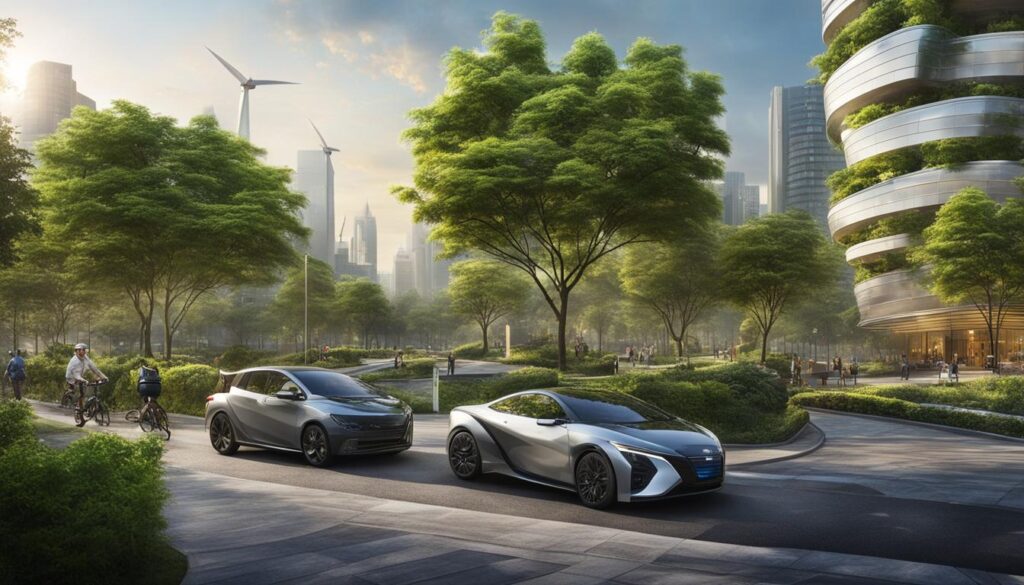
| Key Aspects | Details |
|---|---|
| Community Engagement | The policy promotes active community participation and collaboration to achieve environmentally sustainable outcomes. |
| Continuous Improvement | The Council is committed to ongoing learning and improvement, staying updated with the latest environmental trends and technologies. |
| Accountability | The policy holds the Council accountable for its actions and ensures transparency to ratepayers. |
| Best Practice Environmental Management | The Council strives to implement and adhere to industry-leading environmental management practices. |
The Environment and Sustainability Policy of Benalla Rural City Council sets the foundation for a greener and more sustainable future. It aligns the Council’s activities with environmentally ethical considerations and encourages community involvement. By emphasizing best practice environmental management and continuous improvement, the Council demonstrates its commitment to preserving the natural beauty of the region. Together, we can create a thriving and sustainable community that future generations will be proud to call home.
Scope of the Environment Strategy
As we delve into the details of Benalla Rural City Council’s Environment Strategy, it becomes clear that its scope extends far beyond mere rhetoric. The strategy encompasses a wide range of management priorities and sets the tone for Council activities in the pursuit of sustainability.
Water conservation, energy production and conservation, waste generation and recycling, as well as native vegetation management, are just a few key areas that fall under the strategy’s umbrella. By focusing on these aspects, the Council demonstrates its commitment to holistic and comprehensive environmental management.
It is important to note that the Environment Strategy is not merely a document for show. It is binding on Councillors, Council Staff, contractors, and consultants engaged by the Council. This level of commitment ensures that the strategy is more than just words on paper; it is a guiding force that shapes decision-making processes and drives tangible action.
Through its all-encompassing scope, the Environment Strategy ensures that every facet of Council activities is approached with an environmentally conscious mindset. By embedding sustainability within the core of their operations, Benalla Rural City Council sets a strong example for other local governments and organizations to follow.
Principles of Environment and Sustainability
When it comes to promoting environmental sustainability, the principles that guide Benalla Rural City Council are fundamental to their success. These principles not only ensure that the council works in harmony with the community but also foster a sense of collective responsibility towards the environment. By emphasizing participation, collaboration, and justifiable actions, the council is able to make a meaningful impact on the environment and inspire positive change.
Participation: Engaging the Community for a Greener Future
The principle of participation lies at the heart of Benalla Rural City Council’s environmental initiatives. The council believes that by actively involving the community in decision-making processes, they can create a stronger sense of ownership and shared responsibility. Through public consultations, community forums, and educational programs, the council encourages individuals to become active participants in shaping a greener future for Benalla Rural City. By empowering the community, they can collectively drive sustainable practices and create a lasting impact.
Working Together: Collaboration for Greater Environmental Impact
The council recognizes that true environmental change requires collaboration and partnerships. By working together with community groups, organizations, and businesses, Benalla Rural City Council is able to leverage the expertise, resources, and ideas of a diverse range of stakeholders. This collaborative approach fosters innovation, allows for knowledge sharing, and enables the council to tackle complex environmental challenges more effectively. By fostering a culture of collaboration, the council aims to maximize its environmental impact and build a more sustainable future for all.
Justifiable Actions: Making Informed and Responsible Choices
In their commitment to environmental sustainability, Benalla Rural City Council understands the importance of making justifiable actions. This principle involves conducting thorough research, seeking expert advice, and evaluating the environmental impact before implementing any initiatives or projects. By taking responsible actions based on sound evidence and analysis, the council ensures that their efforts are both effective and sustainable in the long term. Justifiable actions also promote transparency and accountability, allowing the community to trust in the council’s commitment to the environment.
Introduction to Environmentally Sustainable Development Roadmap
As we continue to prioritize environmental sustainability, the Benalla Rural City Council is actively implementing the Environmentally Sustainable Development (ESD) Roadmap. This comprehensive roadmap provides a framework for incorporating sustainable practices into building and subdivision development within our community. By updating the planning policy framework and specific provisions, we aim to address key areas such as energy efficiency, water conservation, waste management, transportation, landscaping, and urban heat and pollution.
The ESD Roadmap reflects our commitment to creating a greener and more sustainable future. By integrating these practices into our planning and development processes, we can ensure that our community grows in a way that is environmentally responsible and socially conscious.
Prioritizing Energy Efficiency and Water Conservation
One of the key areas of focus in the ESD Roadmap is improving energy efficiency in building and subdivision development. By promoting the use of renewable energy sources and implementing energy-saving measures, we can reduce our overall carbon footprint and contribute to a cleaner environment. Furthermore, water conservation is another vital aspect of sustainable development. Through the ESD Roadmap, we are exploring innovative solutions to minimize water consumption, such as implementing rainwater harvesting systems and promoting water-efficient practices in landscaping and irrigation.
Enhancing Waste Management and Transportation
Effective waste management is crucial for maintaining a sustainable community. The ESD Roadmap emphasizes the importance of waste reduction, recycling, and responsible disposal practices. By implementing recycling programs and encouraging waste-to-energy initiatives, we can minimize the amount of waste that ends up in landfills and promote a circular economy.
Transportation is another significant factor in promoting sustainability. The ESD Roadmap seeks to enhance transportation systems that prioritize public transport, cycling, and walking. By encouraging alternative modes of transportation, we can reduce carbon emissions and create a healthier, more livable community.
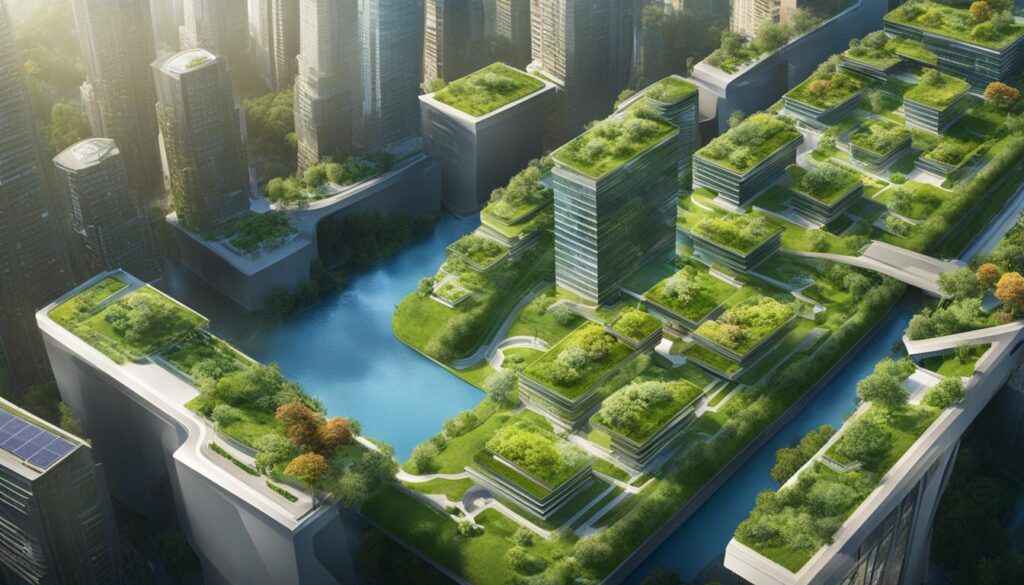
The Environmentally Sustainable Development Roadmap is a testament to our dedication to environmental stewardship. By incorporating sustainable practices into our planning policy framework and specific provisions, we can ensure that future development aligns with our commitment to environmental sustainability. By working together, we can create a resilient and vibrant community that thrives in harmony with nature.
Key Areas of ESD Planning Reforms
As we delve into the planning reforms implemented by Benalla Rural City Council in relation to Environmentally Sustainable Development (ESD), it is crucial to highlight the key areas that these reforms focus on. The council’s commitment to sustainability is reflected in the reforms designed to improve energy efficiency, promote water conservation, enhance waste management and recycling practices, develop sustainable transportation options, implement green landscaping strategies, address urban heat issues, and reduce air and noise pollution.
Energy efficiency is a top priority in ESD planning reforms. The council is actively working to encourage the use of renewable energy sources and increase energy efficiency in buildings. This includes promoting the installation of rooftop solar panels, incentivizing energy-efficient building designs, and exploring alternative energy options such as community energy projects.
Water conservation is another critical aspect of ESD planning reforms. Benalla Rural City Council aims to reduce water consumption and promote responsible water usage. This involves implementing water-saving measures in buildings, promoting water-efficient landscaping practices, and educating the community about the importance of water conservation.
Furthermore, waste management and recycling practices are being improved through ESD planning reforms. The council is focused on reducing waste generation and increasing recycling rates within the community. Initiatives such as waste-to-energy projects and improved waste management infrastructure aim to minimize the environmental impact of waste disposal.
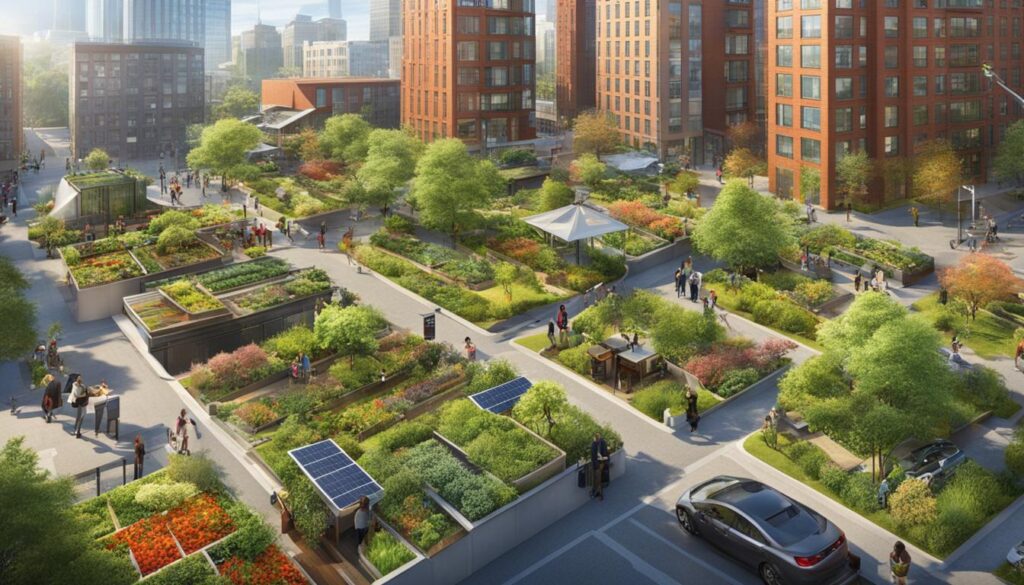
| Key Areas of ESD Planning Reforms | Objectives |
|---|---|
| Energy Efficiency | Promote the use of renewable energy sources and increase energy efficiency in buildings. |
| Water Conservation | Reduce water consumption and promote responsible water usage through water-saving measures and education. |
| Waste Management | Improve waste management and recycling practices to minimize environmental impact. |
| Transportation | Develop sustainable transportation options to reduce reliance on fossil fuels and promote greener modes of travel. |
| Landscaping | Implement green landscaping strategies to enhance biodiversity, reduce water usage, and improve air quality. |
| Urban Heat | Address urban heat issues through strategies like urban tree planting and cool roof initiatives. |
| Air and Noise Pollution | Take measures to reduce air and noise pollution in the community to create a healthier living environment. |
Evidence of Benalla Rural City Council’s commitment to ESD planning reforms can be seen in the table above, which summarizes the key areas and objectives of these reforms. By focusing on energy efficiency, water conservation, waste management, transportation, landscaping, urban heat, air and noise pollution, the council aims to create a more sustainable and environmentally friendly city for its residents.
In the next section, we will explore the relationship between Victoria’s Big Housing Build initiative and the inclusion of ESD requirements in new housing developments.
Victoria’s Big Housing Build and ESD
As a part of the ongoing efforts to promote sustainable housing practices, Benalla Rural City Council strongly supports the inclusion of Environmentally Sustainable Design (ESD) requirements in Victoria’s Big Housing Build initiative. This initiative presents a valuable opportunity to incorporate sustainable design features and practices into new housing developments, ultimately contributing to a more environmentally friendly and energy-efficient future.
By integrating ESD principles into the planning and construction of new homes, we can address key sustainability issues and reduce the environmental impact of housing. This includes promoting energy efficiency, encouraging the use of renewable materials, and implementing environmentally friendly design strategies. Victoria’s Big Housing Build provides the platform to make these sustainability goals a reality.
The inclusion of ESD in the housing development process not only benefits the environment but also improves the quality of life for residents. Energy-efficient homes result in lower energy bills and increased comfort, while sustainable materials and design features contribute to healthier living spaces. With Victoria’s Big Housing Build prioritizing sustainable practices, we can create resilient communities that thrive in the face of environmental challenges.
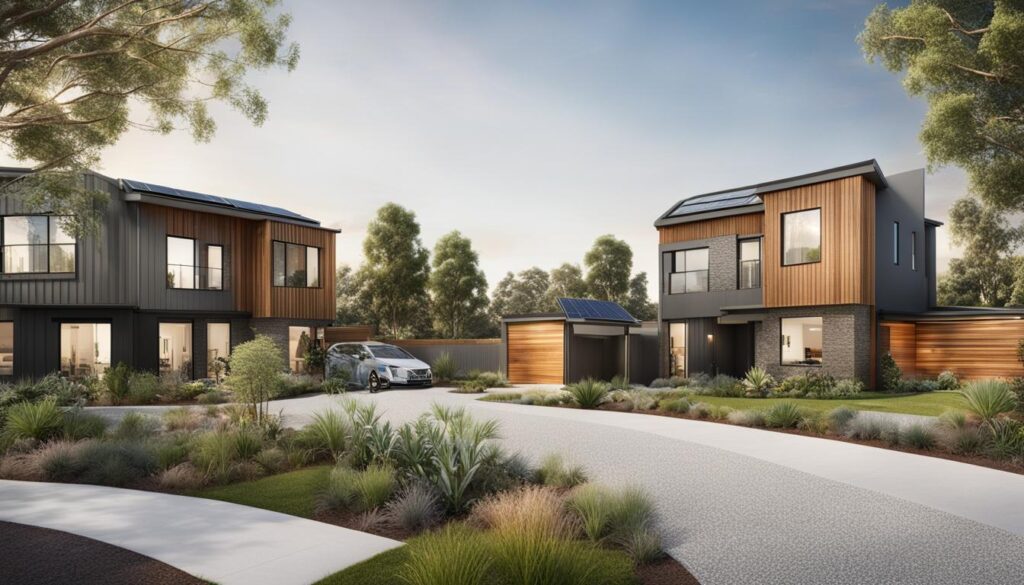
Promoting Sustainable Housing Features
Through the incorporation of ESD requirements, new housing developments can showcase a range of sustainable features and technologies. These may include:
- Energy-efficient appliances and lighting to reduce energy consumption.
- Solar power installations to generate renewable energy.
- Rainwater harvesting systems to conserve water resources.
- Efficient insulation and building materials for improved thermal performance.
- Native landscaping and green spaces to enhance biodiversity and mitigate urban heat island effects.
By embracing environmentally sustainable design principles, Victoria’s Big Housing Build initiative will play a crucial role in shaping a greener and more sustainable future for our communities.
Collaboration for a Sustainable Future
Achieving sustainable housing requires collaboration between the government, developers, and the community. Benalla Rural City Council is committed to working alongside stakeholders to encourage the adoption of ESD practices in new housing developments. By fostering partnerships and providing support, we can collectively create a positive impact on the environment and ensure a sustainable future for generations to come.
| Sustainable Housing Features | Benefits |
|---|---|
| Energy-efficient appliances and lighting | Reduced energy consumption and lower electricity bills |
| Solar power installations | Renewable energy generation and reduced reliance on traditional power sources |
| Rainwater harvesting systems | Conservation of water resources and decreased demand on water supply |
| Efficient insulation and building materials | Improved thermal comfort and reduced heating and cooling costs |
| Native landscaping and green spaces | Biodiversity enhancement and mitigation of urban heat island effects |
Capturing ESD Requirements in Planning Provisions
As we continue our exploration of Environmentally Sustainable Design (ESD) in Benalla Rural City Council, it is essential to understand how ESD requirements are integrated into planning provisions. By capturing these requirements, we can ensure that sustainable practices are embraced and implemented in all development activities, including single dwellings and heritage considerations.
One key aspect of capturing ESD requirements is through the inclusion of VicSmart provisions. VicSmart is a streamlined planning permit process that aims to fast-track low-impact developments. It provides clear guidelines and requirements for various forms of development, including single dwellings. By incorporating ESD considerations into VicSmart provisions, we can ensure that sustainable design principles are upheld in new construction projects, promoting energy efficiency and environmental sustainability.
In addition to single dwellings, heritage considerations also play a crucial role in capturing ESD requirements. Heritage buildings and sites hold cultural and historical significance, and any development or renovation must align with preservation objectives. By incorporating ESD assessments into heritage considerations, we can strike a balance between preserving the past and embracing sustainable design practices. This ensures that any modifications or additions to heritage buildings are environmentally responsible and in line with ESD principles.
Table: ESD Requirements in Planning Provisions
| Development Type | VicSmart Provisions | ESD Considerations |
|---|---|---|
| Single Dwellings | Streamlined permit process | Energy efficiency, sustainable materials, waste management |
| Heritage Buildings | Preservation guidelines | ESD assessments, preservation of historical features, sustainable renovations |
| Commercial Developments | Clear guidelines for sustainable design | Energy efficiency, water conservation, waste management |
By capturing ESD requirements in planning provisions, Benalla Rural City Council is taking a proactive approach to sustainable development. Whether it’s through VicSmart provisions for single dwellings or considering heritage considerations, the council ensures that all development activities align with environmental sustainability goals. This commitment to ESD reflects the council’s dedication to creating a greener and more sustainable future for the community.
Community Engagement and Collaboration
I am thrilled to share how Benalla Rural City Council actively engages with the community through an array of sustainability programs and initiatives. As a dedicated member of the council, I believe that involving households, schools, and businesses in these programs is essential to creating a more environmentally conscious and resilient community. Our goal is to foster collaboration and empower individuals to take action towards a sustainable future.
One of our flagship programs is the “Green Schools Initiative,” where we partner with local schools to educate and inspire students about sustainability. Through interactive workshops and initiatives such as recycling contests and tree planting days, we engage young minds and instill in them a sense of responsibility towards the environment. It’s incredible to witness the enthusiasm and dedication of these students as they actively participate in building a greener future for our city.
Quotes from Community Partners:
“The collaboration between Benalla Rural City Council and our business has been invaluable. Through joint initiatives, we have been able to reduce our carbon footprint and implement sustainable practices that not only benefit the environment but also our bottom line.” – Jane Smith, Local Business Owner
“As a resident, I appreciate the council’s efforts to involve the community in sustainability programs. It has motivated me to make positive changes in my own lifestyle and become an active advocate for environmental conservation.” – Liam Johnson, Benalla Resident
We also work closely with community groups and organizations, recognizing that collective action is crucial in creating lasting impact. By fostering partnerships with local environmental groups, we are able to collaborate on projects such as community gardens, waste reduction campaigns, and renewable energy initiatives. Together, we can achieve greater results and create a culture of sustainability that extends beyond the council’s efforts.
| Program | Description |
|---|---|
| Green Schools Initiative | A program aimed at engaging students and promoting sustainability through workshops, contests, and hands-on activities. |
| Community Gardens | Partnering with community groups to establish and maintain communal gardens that promote locally grown produce and foster a sense of community. |
| Waste Reduction Campaigns | Working with local organizations to raise awareness about waste reduction strategies and encourage recycling and composting. |
| Renewable Energy Initiatives | Collaborating with community partners to implement solar energy projects and explore opportunities for harnessing renewable resources. |
Promoting Renewable Energy and Waste Management
As we strive to build a more sustainable future for Benalla Rural City, renewable energy and effective waste management play crucial roles in reducing our environmental impact. Through innovative initiatives and community collaboration, we are actively promoting renewable energy sources and implementing sustainable waste management practices.
Renewable Energy Initiatives
One of our key focuses is the adoption of renewable energy technologies in our community. To harness the power of the sun, we have been installing rooftop solar panels on public buildings and facilities. These solar installations not only reduce our reliance on fossil fuels but also contribute to energy cost savings for the council and the community.
In addition to individual solar panels, we are also exploring community energy projects. These projects involve the development of solar farms and other renewable energy infrastructure that can be shared and utilized by the entire community. By pooling resources and implementing larger-scale renewable energy projects, we can maximize the benefits and make a significant impact on reducing carbon emissions.
Effective Waste Management
Proper waste management is another critical aspect of our sustainability efforts. We are committed to finding innovative solutions to reduce waste and minimize its impact on the environment. As part of this commitment, we are investigating the feasibility of waste-to-energy projects. These projects aim to convert waste materials into clean energy sources, further contributing to our renewable energy goals.
Furthermore, we actively promote recycling and waste reduction practices within the community. We educate and raise awareness about the importance of recycling and provide resources to facilitate proper waste disposal. By encouraging responsible waste management practices, we can divert waste from landfills and conserve valuable resources.
| Renewable Energy Initiatives | Effective Waste Management |
|---|---|
| Solar panel installations on public buildings | Investigating waste-to-energy projects |
| Community energy projects | Promoting recycling and waste reduction |
Through our commitment to renewable energy and effective waste management, we are not only reducing our carbon footprint but also creating a more sustainable future for Benalla Rural City. By embracing renewable energy sources and implementing efficient waste practices, we can leave a positive environmental legacy for generations to come.
Conclusion
Well, folks, that’s a wrap! We’ve delved into the exciting world of environmentally sustainable design (ESD) in Benalla Rural City Council. From the Environment Strategy to the ESD planning reforms, this council is serious about sustainability.
Benalla Rural City Council recognizes the importance of creating a greener and more environmentally friendly future for its community. With a focus on water conservation, energy production, waste recycling, and native vegetation conservation, they’re ticking all the right boxes.
But it doesn’t stop there. The council is actively engaging with the community, involving households, schools, and businesses in sustainability programs. Through education, collaboration, and community involvement, they’re working towards a more sustainable Benalla Rural City.
So, here’s to Benalla Rural City Council and their commitment to environmentally sustainable design. With their proactive approach and dedication to sustainability, they’re paving the way for a greener future. Cheers to that!
FAQ
What is the Environment and Sustainability Policy?
The Environment and Sustainability Policy provides guidance, consistency, and direction to Council activities with environmentally ethical consideration. It aims to demonstrate accountability to ratepayers and apply elements of best practice environmental management.
What does the Environment Strategy cover?
The Environment Strategy in Benalla Rural City Council covers all aspects of Council activities and focuses on areas such as water conservation, energy production and conservation, waste generation and recycling, and native vegetation management.
What are the principles of Environment and Sustainability?
The principles of Environment and Sustainability include early and honest engagement with the community, development and maintenance of relationships, consideration of environmental impact, empowerment through education and information, respect for different views and ideas, accountability for actions, and continuous improvement in environmental sustainability.
What does the Environmentally Sustainable Development Roadmap involve?
The Environmentally Sustainable Development Roadmap provides a framework for implementing sustainable practices in building and subdivision development. It involves updating the planning policy framework and particular provisions to address key areas such as energy efficiency, water conservation, waste management, transportation, landscaping, urban heat, air and noise pollution.
What are the key areas of ESD planning reforms?
The key areas of ESD planning reforms in Benalla Rural City Council include improving energy efficiency, promoting water conservation, enhancing waste management and recycling practices, developing sustainable transportation options, implementing green landscaping strategies, addressing urban heat issues, and reducing air and noise pollution.
How does Benalla Rural City Council support sustainable housing?
Benalla Rural City Council supports the inclusion of ESD requirements in Victoria’s Big Housing Build initiative. This aims to ensure that sustainable housing practices are incorporated into new housing developments to promote energy efficiency, use of renewable materials, and environmentally friendly design features.
How are ESD requirements captured in planning provisions?
ESD requirements are captured in planning provisions, including provisions for VicSmart developments. This includes addressing ESD considerations in single dwelling developments, ensuring the inclusion of heritage considerations in ESD assessments, and promoting sustainable design practices in all planning processes.
How does the council engage with the community in sustainability efforts?
Benalla Rural City Council actively engages with the community through sustainability programs and initiatives. This includes involving households, schools, and businesses in sustainability programs, operating education and awareness programs, and fostering collaboration with community groups and organizations to achieve environmental goals.
How does Benalla Rural City Council promote renewable energy?
Benalla Rural City Council promotes renewable energy through initiatives such as rooftop solar installations, community energy projects, and investigating the feasibility of waste-to-energy projects. These efforts aim to reduce energy consumption, increase renewable energy production, and enhance waste management practices.
What is the goal of Benalla Rural City Council in terms of sustainability?
Benalla Rural City Council is committed to implementing environmentally sustainable design practices and promoting sustainability within the community. Through their Environment Strategy and collaboration with community groups, the council aims to create a more sustainable and environmentally friendly future for Benalla Rural City.
Source Links
- https://www.mav.asn.au/__data/assets/pdf_file/0015/27240/MAV-Submission-ESD-Roadmap.pdf
- https://new.parliament.vic.gov.au/496eb5/contentassets/7b6f7812d465466aa0f962f3db6940cd/t044-benalla-sustainable-future-group.pdf
- https://www.benalla.vic.gov.au/files/assets/public/all-pdfs/document-environment_strategy_2016_20.pdf
